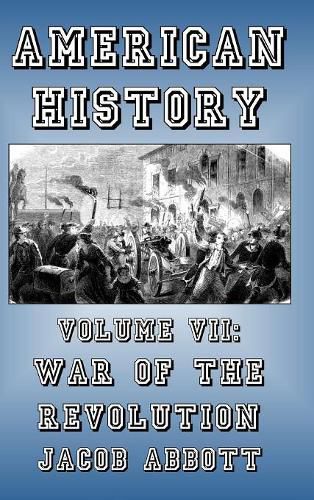Readings Newsletter
Become a Readings Member to make your shopping experience even easier.
Sign in or sign up for free!
You’re not far away from qualifying for FREE standard shipping within Australia
You’ve qualified for FREE standard shipping within Australia
The cart is loading…






This title is printed to order. This book may have been self-published. If so, we cannot guarantee the quality of the content. In the main most books will have gone through the editing process however some may not. We therefore suggest that you be aware of this before ordering this book. If in doubt check either the author or publisher’s details as we are unable to accept any returns unless they are faulty. Please contact us if you have any questions.
Part seven of an eight part series on the history of America from its earliest times through to the age of George Washington, told by master storyteller Jacob Abbott.
Abbott recounts in gripping style not merely the main facts of the American Revolution, but also fascinating personal details, and little-known twists and turns of this tumultuous, world history-changing event.
Read in detail the course of events, starting with the First Continental Congress, the opening shots at the battles of Lexington and Concord, the early British successes, the imported Hessian mercenaries, the daring bravado of General George Washington, and the great battles of the war, ending with the surrender of Cornwallis and the treaty of peace.
The new ministry immediately took measures for negotiating a treaty of peace, and the news was received in the American camps by the war-worn and exhausted soldiers, and among all the towns and villages throughout the country, by the whole population, with unbounded joy.
The people had indeed great occasion to rejoice, for the means and resources of the government for carrying on the war, and even for keeping their armies in the field, were almost entirely gone, and the soldiers in all the camps were reduced nearly to the last stages of destitution and suffering. Still, if the end had not been thus received, the country would have aroused itself to new efforts and continued the struggle.
$9.00 standard shipping within Australia
FREE standard shipping within Australia for orders over $100.00
Express & International shipping calculated at checkout
This title is printed to order. This book may have been self-published. If so, we cannot guarantee the quality of the content. In the main most books will have gone through the editing process however some may not. We therefore suggest that you be aware of this before ordering this book. If in doubt check either the author or publisher’s details as we are unable to accept any returns unless they are faulty. Please contact us if you have any questions.
Part seven of an eight part series on the history of America from its earliest times through to the age of George Washington, told by master storyteller Jacob Abbott.
Abbott recounts in gripping style not merely the main facts of the American Revolution, but also fascinating personal details, and little-known twists and turns of this tumultuous, world history-changing event.
Read in detail the course of events, starting with the First Continental Congress, the opening shots at the battles of Lexington and Concord, the early British successes, the imported Hessian mercenaries, the daring bravado of General George Washington, and the great battles of the war, ending with the surrender of Cornwallis and the treaty of peace.
The new ministry immediately took measures for negotiating a treaty of peace, and the news was received in the American camps by the war-worn and exhausted soldiers, and among all the towns and villages throughout the country, by the whole population, with unbounded joy.
The people had indeed great occasion to rejoice, for the means and resources of the government for carrying on the war, and even for keeping their armies in the field, were almost entirely gone, and the soldiers in all the camps were reduced nearly to the last stages of destitution and suffering. Still, if the end had not been thus received, the country would have aroused itself to new efforts and continued the struggle.